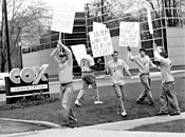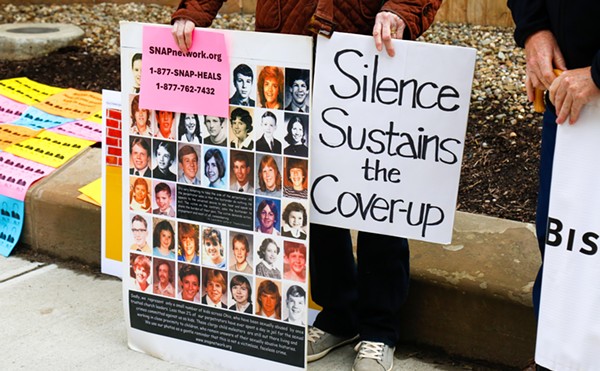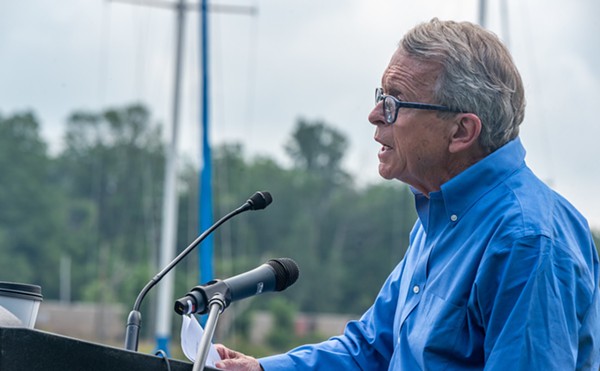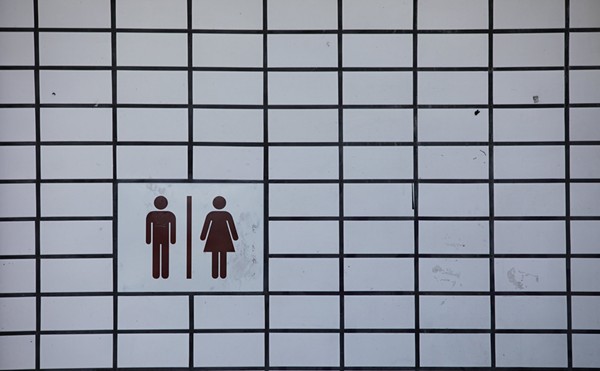
As the primary characters in the three-year-old variety show, these guys are fairly adept at making asses of themselves. Karaoke offers little challenge.
Aaron McBride takes the stage. Thirty seconds into the Red Hot Chili Peppers' "Give It Away," his convulsions and tommy-gun delivery have turned every head in the bar. He's out of breath by the end, and the twentysomething crowd hoots its approval.
McCarthy's offers a better stage than McBride is used to. For all the dedicated toil that goes into Last Call, the show still languishes in television obscurity.
Last Call might be described as Letterman meets Larry Sanders, except with more skits and considerably fewer appearances by J. Lo. The closest it's come to a celebrity was a guest billed as "a guy who once met Gene Hackman." It's orchestrated protests at the Rock Hall for the snubbing of Sir-Mix-A-Lot. It's spoofed everything from drunk-driving commercials to Michael Stanley. There are also recurring characters like "The Coolest Guy in the World," who never talks, never takes off his shades, and buys condoms in bulk.
The show can be both hilarious and uneven, but on the Kent State campus, where it appeared on TV-2, it was good enough to grant the cast celebrity. Trips to Kent bars would bring hugs from strange women and beer showers from frat boys, who are lampooned in one popular skit. The response was encouraging enough that, after graduation, the cast decided to test its mettle in Cleveland. Free labor from fans and friends, plus production equipment bought on credit, made for low overhead. It would be just a matter of dropping a tape off at cable companies, so it could air on public access.
But on this night in late April, as one of his partners screeches karaoke, Last Call host James Renner agonizes over the one detail of local television the group overlooked: "There is no local television."
Legally speaking, homegrown shows are supposed to be allowed on public access. When a cable company signs a contract with a city, it's obligated to leave channels open for the public in exchange for its monopoly. Depending upon the contract, it's also supposed to supply studio time and production equipment, usually for free.
All of which sounds splendid. If it were actually happening.
After Carl Stokes died in 1996, Bert Jennings wanted the former mayor and congressman to still have a voice, so he launched The Carl Stokes Forum (televised at 5 p.m. on Tuesdays and 1 p.m. Thursdays on Channel 25 in Cleveland; and 11 p.m. on Thursdays on Channel 21 in the eastern suburbs). Today, the show's thrust is challenging Cleveland's black politicians, who Jennings believes get a free ride from the rest of the media. "We have all these black leaders, but why are conditions so terrible in black neighborhoods?" he asks.
Naturally, the show has candor galore. It's a lively, edgy program, where the black community can argue about its issues and leadership. Jennings only wishes more people could see it -- like the customers of Cox Communications, for instance. "That's the whole West Side," he says. "I'd love to have that." He'd also like to reach East Cleveland and Shaker Heights.
But Jennings has long since given up on Cox. "They told me I had to pay," he says. He heard the same from East Cleveland Cable. Americast, which served Shaker Heights, told him it would get back to him when its network was online. That was a year ago. It has since given way to WideOpenWest. Jennings intends to court it, too, but his enthusiasm is waning.
Cable companies -- and the cities they contract with -- aren't particularly enthusiastic about discussing their public access policies, either. East Cleveland Cable refused to talk about its policies. (City Law Director Abdoul Rahiam AbdoulKariam says the company is entitled to charge for public access, though the fees are being reviewed.)
A WideOpenWest spokesman says cable access in Shaker Heights is run by the city, but Law Director Margaret Cannon did not return repeated phone calls.
Such reluctance to talk is a recurring theme. Those who produce their own shows say it's one of the many tactics used by cable companies to keep them off the air. Besides fees, some companies will refuse shows by citing poor technical quality, then make it extremely difficult to use their studios for professional production. Others invoke loosely defined "community standards," allowing them to block shows seemingly by whim. And when these strategies fail, they simply won't return phone calls.
Robert Kelber used to produce a children's show that aired on Cox. Then he decided to launch a new show, SEP Mayhem, a spoof of pro wrestling. After a few episodes, Cox pulled it off the air. When Kelber asked for an explanation, JoAnn Mason, who presides over local programming for Cox, said the show's technical quality wasn't up to company standards. Kelber responded that, because he was now using better equipment, SEP Mayhem was technically superior to his children's show, which ran on Cox for three years.
Then Cox complained that SEP Mayhem was using copyrighted music, so Kelber purchased royalty-free music and showed Cox his license. But the company simply broke off communication, he says. Cox wouldn't return phone calls, nor would it respond to Kelber's letters. Three years later, he's still trying to get on the air.
Mason claims she never received the license and that the show's "technical quality [is] lacking."
Since cable operators seem so resistant to the "public" part of public access, Cleveland-Akron Television (CAT) decided to make it easier for both sides. It would skim the cream of public access and make it available on one independent commercial station. Cable companies would get one-stop shopping, viewers would have a channel devoted to hometown programming, and shows would be free to seek advertising, using the money to beef up quality.
Not surprisingly, CAT also encountered roadblocks. "We're having trouble following through with that mission," says President Bob Klaus.
CAT began its foray into Cleveland in 1996, after beginning as a low-power station for Akron and Kent six years before. Klaus knew CAT would have to earn its way onto the region's cable systems, but he guessed that the lack of local programming, in addition to Cleveland's robust heritage of making its own TV, would create demand.
Son of Ghoul's House of Fun and Games, heir to kitsch legend Ghoulardi, was CAT's flagship. The station would also air high school sports and Ohio State basketball games. Other shows bold enough to find their own advertising could air for a nominal fee.
Each year, Klaus says, he sweetened the package to persuade cable companies to add CAT to their systems. So far, none have.
"You make a show by getting sponsors," says Klaus, "but to get sponsors, the show has to be seen. And the cable company is the gatekeeper."
Klaus admits he mistakenly assumed cable systems would welcome a local station. "They usually say, 'Our customers don't want you,'" he says. "But I get hundreds of phone calls, faxes, and letters from customers saying they want to see us on the air."
Some companies accused Klaus of asking for too much, so he offers his signal for free. When he satisfies this objection, the cable companies simply "pretend we don't exist," he says.
Dottie Fox, a spokeswoman for Adelphia, says she's never heard of CAT. "But in general, our cable space is very valuable, and the only way we would put a channel on is if we were sure people wanted to watch it."
Cox's Mason says her company doesn't offer CAT "because the signal strength is too low for us to pick it up." It's a peculiar argument to Klaus, since he gets fan mail from viewers in Canada. "We have a tower in Parma, and [Cox's] antenna is in Parma," he says. "If we can get to Ontario, we can sure get down the street to your antenna."
One of CAT's most popular shows is Last Call, still widely viewed by Kent students and alumni. After finding that CAT has zero penetration in Cleveland, Last Call applied for a slot on public access. Adelphia agreed (the show runs Thursday and Friday at midnight on Channel 21). But Cox -- and JoAnn Mason, in particular -- has been slower to come around.
As the cable source for Lakewood, where Kent State alumni gather in droves, Cox represented Last Call's best chance to capitalize on its collegiate success. Moreover, Cox's public access channel is largely void of local programming. So James Renner began calling Mason last fall.
She told him she had to watch the show to ensure it was up to technical standards, he says. She found copyrighted music that had to be edited out. She also wanted the show recorded on Super VHS (most cable companies run on regular VHS). Cox could dub Last Call's tapes onto Super VHS, but there would be an undisclosed fee. In between requests, Renner says, Mason would go for months without returning his calls.
"They give us the runaround, hope we just go away," says Last Call co-host Mike Polk. "The bottom line is that they don't want what they presume to be poorly produced TV junking up their cable system."
Not so, claims Mason. She says Cox has plenty of available time, and there is no dubbing fee; it's just that so few people are interested in airing their own shows.
Yet those who've had their phone calls spurned by Mason find her argument laughable. They say Cox is doing its best to ward off prospective shows. For example, the company limits its studio times to Tuesday afternoons, precluding use by most anyone with a job. The first five minutes are free. After that, Cox starts billing. "You can't even turn the cameras on in five minutes," says Polk.
Cox's contract with Lakewood requires the company to provide "access support," which includes a studio, equipment, and training. It mentions nothing about fees. Mason says the 5-minute rule was recently expanded to 30 minutes, and that while users were warned of charges, no one was actually billed.
(Attorneys for Lakewood declined to comment on whether Cox was complying with the contract.)
The pay-to-play rule was enough to deter Jennings, who vows to complain to the FCC. Yet Last Call handles its own production, and getting on Cox would simply be a matter of dropping off the tape.
All of which makes it odd that the company, supposedly desperate to fill its public access channel, would leave the show hanging for six months.
So a few weeks ago, the cast members flung diplomacy out the window and plotted a guerrilla maneuver. They would stage a profane picket in front of Cox headquarters and film it as a skit for the show. They penned placards with phrases such as "Cox sux" and "Cox leaves a bad taste in our mouths."
They also notified WOIO-TV/Channel 19 of the protest. A 19 reporter called Cox. With the possibility of news cameras looming outside its building, Cox suddenly became very interested in the show. By the time the Last Call cast arrived, Mason was waiting with profuse apologies and a promise of air time.
Still, being forced to endure months-long struggles just to get supposedly free air time is troubling, says Professor Robert Thompson, a media analyst at Syracuse University. "When you have to mount a protest and get another media source in your corner to get someone to put your tape on public access, that's a sign of a deregulated media environment gone totally mad," he says.
Mason insists it's all a misunderstanding. "This is the first time that's happened," she says of the Last Call fiasco. She adds that her busy schedule kept her from responding earlier. The show now runs Mondays and Tuesdays at 11 p.m. on Channel 45.
Cast members admit their college brand of humor isn't for everybody. But in an age when fringe networks like the WB and UPN air coast-to-coast, Last Call feels its product, if still raw, is superior to most half-hours on TV.
"We're way funnier than Moesha," says Polk, referring to the ubiquitous Brandy sitcom.
Yet the cast members are somewhat demoralized by the lengths they had to go to. Klaus guesses others will give up after encountering the third and fourth waves of resistance.
"There are a lot of creative people in this community, like the cast of Last Call, that can put together a quality program," he says. "But because of the cable companies, they may never get exposure."











